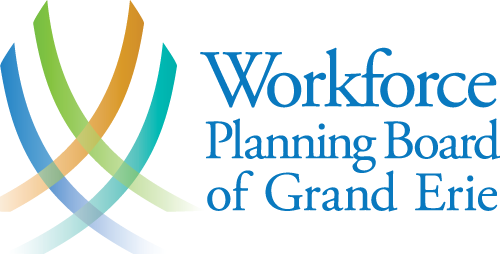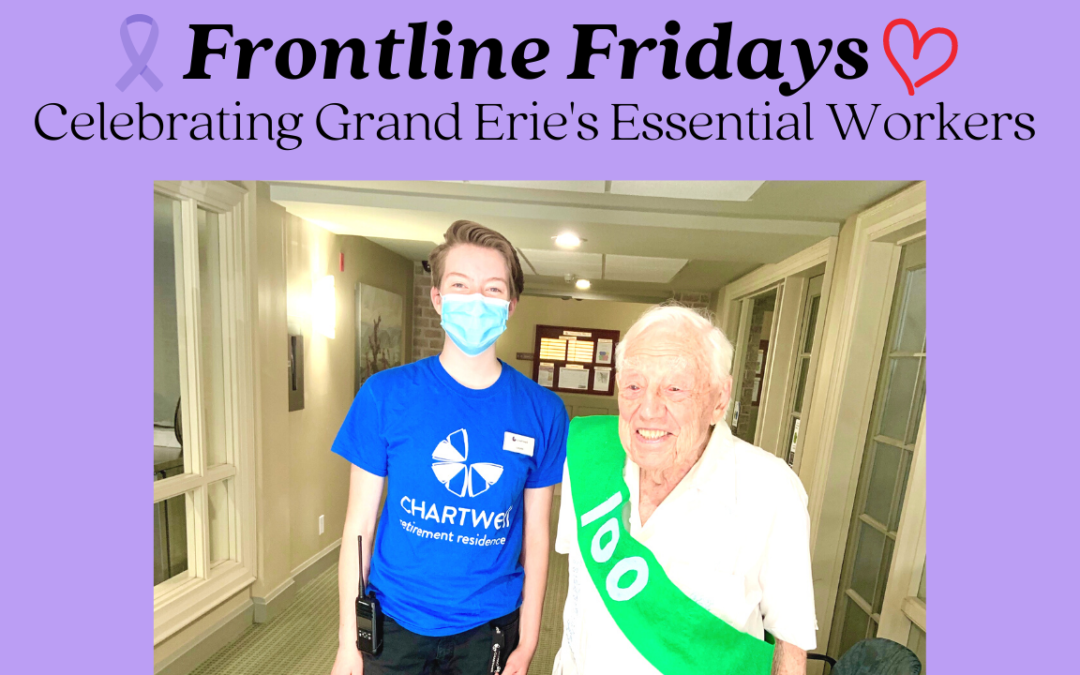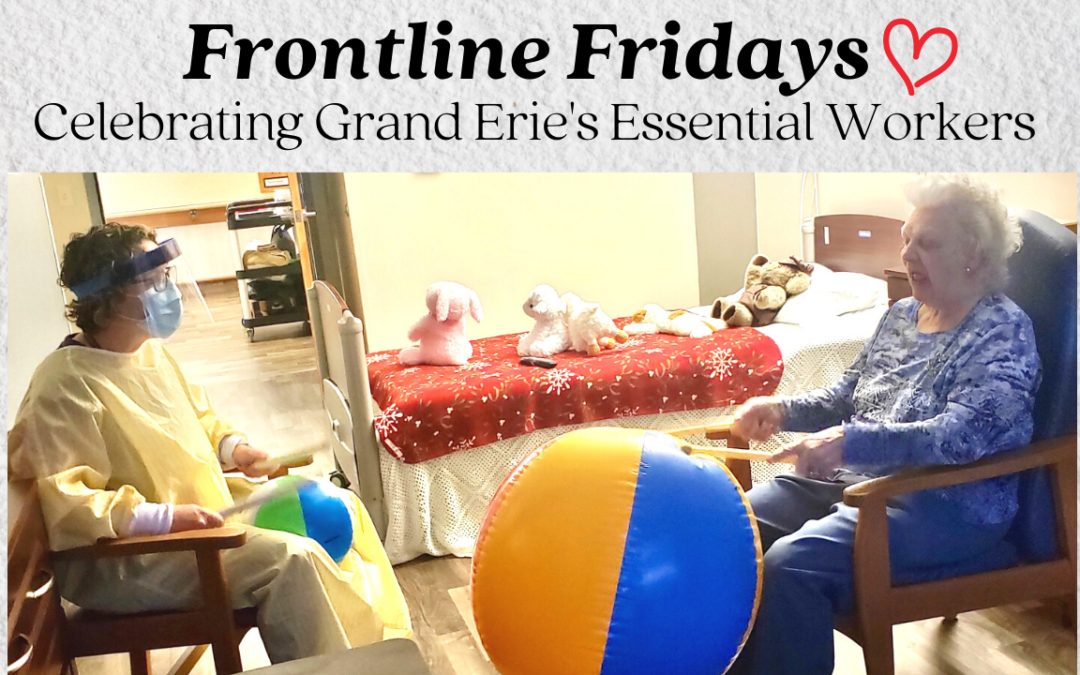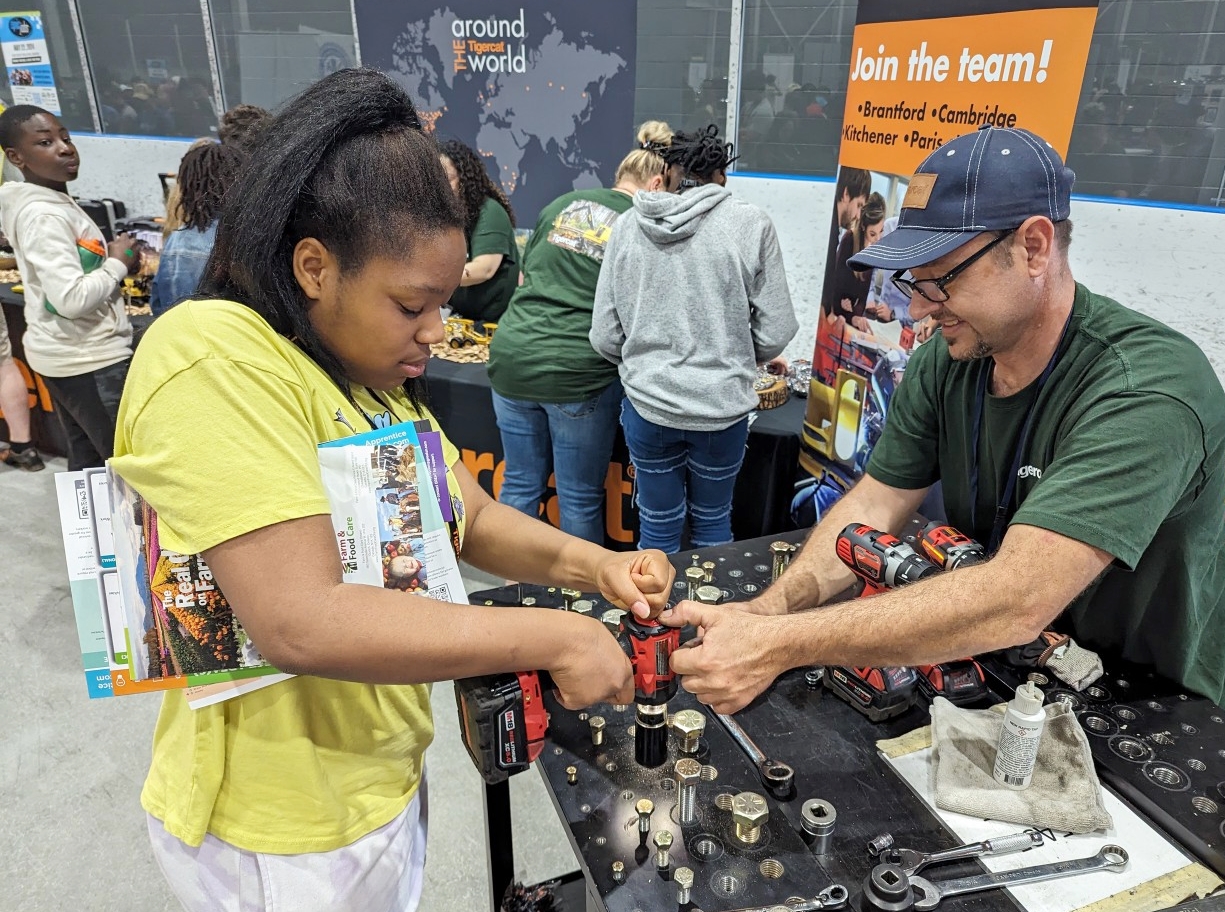In this week’s Frontline Fridays feature we talk to Laura Middelkoop, a Grade 12 student at Brantford Collegiate Institute. Frontline Fridays stories pay tribute to Grand Erie essential workers in the communities of Brantford, Six Nations, New Credit, and the counties of Brant, Haldimand and Norfolk.
During COVID-19, Laura has been working two part-time jobs: at Metro Grocery Store and the Chartwell Tranquility Place Retirement Residence in Brantford.
Laura’s great grandfather, Mick Collins, who was a resident of Tranquility Place sadly passed away during the time this interview was conducted. The staff of the Workforce Planning Board of Grand Erie wish to extend our deepest condolences to Laura and her family during this difficult time. Thank you Laura, for sharing your story.
What does an average day look like for you?
Laura: I am a student at BCI and during my evenings and weekends, I work two part-time jobs – at Metro as a cashier and I also work at Chartwell Tranquility Place retirement residence as a receptionist and screener..so it is busy! I am a full-time Grade 12 student and when I am not at one of my jobs, I am currently taking both in person and online classes. I am working hard towards attending university this fall for theatre production.
How has Covid-19 has affected your day-to-day work?
Laura: I have been working at Metro for almost three years, strictly as a cashier. Once the pandemic began, Metro was required to have an employee at the front door to screen all staff and costumers as they entered. I took this opportunity to expand my hours and help out with different departments in the store. Recently, Metro has started to offer online orders with contactless pick up. I took on the responsibility of picking online orders. I understand how important it is to keep our most at-risk customers safe and to discourage more people from going out.
I had been volunteering at Tranquility Place from a young age. When the pandemic hit, I knew I needed to step up and begin working in supporting the retirement community. I worked full time from March to August 2020 delivering mail and packages, doing paperwork, screening incoming visitors and staff, helping in the kitchen, running activities and the tuck shop, and providing companionship and support for the residents. When I returned to full-time school classes in September, I settled in and began working part-time as a screener and receptionist.
What has it been like to be an essential worker during the pandemic?
Laura: It is an honour to be an essential worker during the Covid-19 pandemic. Throughout the pandemic I have been working at two very different essential workplaces and as both my parents are also essential workers, I have seen the pandemic from various angles. I have seen myself and my co-workers go through the highs and lows while working during these times. With changes coming my way every day at work, I think being flexible and focused are the two most important skills I have developed.
What have been the greatest rewards and challenges in your work?
Laura: I try to be very personable when I am working. Having to wear a mask and maintain social distancing has made it much harder to have meaningful interactions with people. At Metro my shifts are much quieter and I miss the silly banter with customers.
Communicating with residents at Tranquility place who have a hearing impairment has been more challenging due to personal protective equipment and social distancing. The greatest reward at Tranquility Place is seeing the positive impact that I could make on other’s lives. I realized just how important the small things can be.
I also got to work in the same building that my great grandfather Mick Collins lived in – a place where visitors have been drastically restricted. He recently passed and it was an incredible gift that I got to see him on his 100th birthday.
What have been your greatest supports and means of coping as an essential worker this past year?
Laura: The most reassuring thing this past year has been knowing that I am not alone. As a cashier at Metro, I am constantly ringing through healthcare professionals, trades people, first responders, and many other essential workers. Seeing these other essential workers all around me inspires and reminds me that we are all working through this together. To cope with the added pressures, I have been trying to take better care of myself this year both physically and mentally. With any extra spare time I have, I’ve been keeping my mind busy by working hard on my university application portfolios.
What made you pursue the work you do in your current jobs? What lead you to take a job in this community?
Laura: Working at Metro has been my part-time job for many years. In early pandemic days, I saw how quickly we would run out of stock. I realized then how important working in a grocery store is. I decided I needed to do more so I took on other roles in the store.
I joined the team at Tranquility Place because I recognized the community needed assistance. I knew that I needed to step up and do my part to help Brantford’s senior population. It will be very bittersweet to move on from these jobs as I go on to study my passion of theatre in university.
What was your training/education?
Laura: I took on the part-time jobs at both Metro and Tranquility Place as a high school student. When I started, I went through each workplace’s specific orientation and training programs. However, training, learning, and adapting never stops in my jobs. I participate in training programs, group communications, staying on top of directives and policies from the provincial government, local public health, and other governing bodies.
What advice would you give to someone interested in following a similar path?
Laura: For students looking to start their employment and career path, I would like them to know that both jobs have been great experiences for me. Lots of chances for new things. Both Metro and Tranquility Place offer opportunities for developing career pathways.
My best advice for students looking for a part time job is to get involved in the community and get your name out there; you never know when the perfect opportunity may come up.
For local training, certification and volunteer and entry level job opportunities for positions like Laura’s:
Job & Training Opportunities
Careers | Metro
Ontario – Sobeys Jobs (sobeyscareers.com)
Retail as a Career Scholarship Program | Retail Council of Canada
Certified Food Handler : Retail Council of Canada – RetailEducation
Food / Beverage | ontariocolleges.ca
Student Employment 2021 – Haldimand County
Get help finding a youth or student job | Ontario.ca
Free Training for Hospitality Industry – Skills2Work | CCES Fanshawe College
Find jobs in Brantford, Brant, Haldimand, Norfolk, Six Nations-New Credit (workforceplanningboard.org)
Welcome to NPAAMB
Volunteering:
Chartwell Retirement Residences Volunteer Opportunities (careersatchartwell.com)
volunteers | brava-website (bravabrant.com)
Volunteer – City of Brantford
Volunteer – Brant County
Volunteer Opportunities – Norfolk County
Community Youth Resources and Assistance
Youth Employment Skills Strategy – Work Readiness and Advancement Program (WRAP) | St. Leonard’s (st-leonards.com)
Job Seeker :: Career Link
The Student Office – GREAT (greatsn.com)












